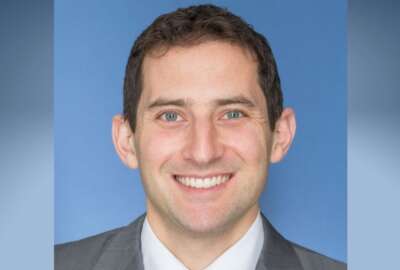Hubbard Radio Washington DC, LLC. All rights reserved. This website is not intended for users located within the European Economic Area.
This innovator tilted at the bureaucratic windmill, and had the same results as Don Quixote
The U.S. financial system and the way it's regulated, are fast moving to obsolescence. And the government is unwilling and unable to adopt the technologies to m...
Best listening experience is on Chrome, Firefox or Safari. Subscribe to Federal Drive’s daily audio interviews on Apple Podcasts or PodcastOne.
The U.S. financial system and the way it’s regulated, are fast moving to obsolescence. And the government is unwilling and unable to adopt the technologies to modernize them. That’s according to my next guest. He spent more than three years trying, as the first chief innovation officer at the FDIC. Sultan Meghji left the agency last month, and joined the Federal Drive with Tom Temin with why.
Interview transcript:
Tom Temin: Sultan, good to have you back.
Sultan Meghji: It’s great to be here, Tom.
Tom Temin: And you left, would it be fair to say you left in disgust towards that overstating it?
Sultan Meghji: I wouldn’t say that, I would say more a frustration and the bruise on my forehead didn’t go away for the last year.
Tom Temin: Well, what happened in there? You were brought in specifically with the title of innovator for an agency that goes way back, you know, almost a depression era agency, and back when gold standard and cash and that’s how banking was done. What’s the difference? What were you trying to do there?
Sultan Meghji: But as you said in the lede, the fact is, is the global financial system is evolving incredibly rapidly. And that pace of change is accelerating. You know, what used to take a few years, then took a few months, and now takes a few weeks. And you know, the vast majority of people and systems in our regulatory environment are designed for the analog era, not the digital era.
In the op-ed, I wrote, I specifically called out that we have a lot of analog people making digital decisions. And it’s a real uphill battle. And I came to the conclusion that it doesn’t really matter where you are in a lot of these agencies, you’re not actually going to be able to impact the change. And so you know, this is where I shifted my focus to looking at how Congress in particular should really start to get more involved and make some of these changes.
Tom Temin: And in your essay, and that was at Bloomberg.com, you mentioned, two halves of the problem, the way I read it. One is that there is not thorough enough understanding or widespread enough understanding of the changes in finance itself, with cryptocurrencies and the speed at which trading happens and all of these things. And then there’s also reluctance to learn the technology that might be needed to get a better handle on what’s going on. Fair way to put it?
Sultan Meghji: That is a very fair way to put it, you know, we have a situation where the market is moving at a tremendous pace, and many of the agencies are just not engaging with what’s happening out there. So bringing in the companies that are building this innovation is an uphill battle, and it’s a struggle. The second half of it is, the Federal workforce is definitely older, you know, the median age in the workforce is in its mid to late 30s. At this point, generally in the federal government, it’s in its late 50s. And so there is this almost generational disconnect. People in their 20s and 30s were born digital, they grew up with laptops and smartphones. And that’s how they work. And, you know, I worked with a lot of people in the federal government who had trouble doing anything besides opening Outlook on their laptop, or they still carried around big file folders, you know, talked about writing memos, and things like that.
The world is evolving fairly quickly. And one of the biggest challenges we have, I think, is not just attracting great talent to the federal government, but keeping them and growing them and the people that are in there, making sure they get continuing education, making sure that they understand that these things are moving them, that’s part of their job. But in many cases, you know, people are promoted based on tenure, not on capability or skill set. And I think we need to revisit how we do that.
Tom Temin: And I wanted to ask you something specific about the FDIC context, it’s the Federal Deposit Insurance Corporation. And essentially, it oversees banks to make sure that they have the right coverage for the deposits people’s personal savings that they have. What in the world, what’s out there in the world that’s changing, that you feel they weren’t keeping up with in that particular domain?
Sultan Meghji: Well, I don’t think we have five or six hours for the rest of this conversation.
Tom Temin: Well give us, you know, a few seconds, anyway.
Sultan Meghji: Yeah, no, I mean, the fact is, people still seem to think that digital banking is different than banking. And that banking is a thing. And digital banking is a small subset of it. The opposite is true. There isn’t a single part of our financial system that isn’t governed by technology, and we need to start addressing it directly like that. That’s number one. The second is the resilience of our financial system. You know, how it serves everyone, whether it’s you on your smartphone, or walking into a branch or whatever, is governed by technology and the threats against that, the risks against our systems are the highest they’ve ever been, and they’re increasing. And it doesn’t matter if we’re talking about floods in Miami, or Russian cyber criminals or anything in between. The vast majority of technologies in our banking system are 15 or more years old. The technologies we bought 15 years ago, and the technologies we buy today are radically different. If you were to go back and think about the Blackberry that you carried in the mid 2000s. And think about trying to order an Uber on that. It’d be impossible. Right? And that’s the same kind of thing we’re struggling with today.
Tom Temin: Yeah, let me tell you I still have a passbook from a savings account, I had a cooperative bank 50 years 60 years ago, where they had burrows machines that would type out in your deposit and blue in the interest of five cents that you earned in red. So yeah, it has changed a lot.
Sultan Meghji: I think five cents is about what I earn interest on my checking account last year. So I feel you.
Tom Temin: Something like that. We’re speaking with Sultan Meghji. Until recently, the chief innovation officer at the FDIC and just spend a minute, if you would, telling us what you feel the effect of cryptocurrency is because it’s not backed by a sovereign nation, presumably like the dollar, it’s backed by simply everyone’s agreeing to say it has this much value. And if you find one, it’s yours, it seems like a flimsy tissue to depend on.
Sultan Meghji: Well, there are certainly a lot of people out there who have stronger opinions on this than I do. I think, you know, it is important to note, you know, a few minutes ago, you made a comment about being on the gold standard for the U.S. dollar, which we moved away from in the early 1970s. And we went to what we now call a fiat currency. And so in a lot of ways, the U.S. dollar issue is worth what it is just because we kind of agree that that’s what it is. So it’s not quite as far as you think. The thing about the entire what I call the Web3 discussion, it’s much broader than individual cryptocurrency. It’s fundamentally about realizing that all of our financial systems are entirely digital and are moving to a place where they’re entirely automated. And so I’m not the biggest fan of most cryptocurrencies out there, I think they’re, they’re kind of toys, in some cases, maybe you know, Ponzi schemes in other cases. I’m much more interested in seeing how we make the U.S. dollar digital. I’m much more interested in seeing how we ensure that as we do that, we are maintaining the equitability and protections that Americans are used to having in things like FDIC insurance.
Tom Temin: So that’s really a Treasury issue more than an FDIC issue.
Sultan Meghji: There are over 100 different regulatory bodies in this country that touch one aspect or another of the banking system. And so to me, all of them have to be working together, collaborating together, and fundamentally under a single strategy. And the fact is, is because of how the various laws going back in some cases, 80, 90, 100 years are written, there’s a lot of ambiguity, there’s a lot of gray area, there are a lot of legal memos, and some of them were written in the 50s that really don’t have as much basis in reality as they need to. And so that’s again, I come back to, I think we’re moving to a point where this is a congressional issue, and the individual agencies are just not going to get where they need to get without outside an outside nudge.
Tom Temin: And fair to say our rival economies like China are getting very digital and currency almost doesn’t exist in the daily lives of people in China.
Sultan Meghji: Well, I would, you know, I think China is a great highlight, Tom, because they are in fact incredibly aggressive in terms of innovating in this space. And they’re doing a fantastic job at that, they’ve really made their economy digital very quickly. You know, the digital Yuan has been the most popular app in the app stores in Asia for ever since it came out. It’s just right up there. Right? So that’s a fascinating thing. But it’s not the currency doesn’t exist, it’s they’ve made it entirely frictionless. You can walk through a store, wave your arm at a teller and you just keep going. And that’s the thing that I think a lot of consumers, a lot of Americans are looking for. They want frictionless financial services, and we are far far away from being the best in the world at that.
Tom Temin: All right, so you have recommendations, then, on a couple of fronts. One is the human capital side of government, such that it has the people and manpower it needs to deal with these issues. And the other is the function of the government with respect to how it treats money, banking, finance and oversight. So let’s just briefly, the human capital side, what’s your big thought there?
Sultan Meghji: Well, we need to get more people who actually understand this technology into the system across it, whether it’s in the banks themselves, you know, we have a little over 4,000 banks in this country. And you know, they skew older, they skew more analog, we need people with STEM backgrounds and direct tech experience in the banks and in the regulatory space. We need far more. I was definitely a far outlier, in my federal experience in terms of having applied experience with these technologies. So that’s the kind of the big thought there is we just need more people. And in some cases, you get new people other cases, you train the existing people that you know, and then third is you collaborate. We don’t have to invent everything inside each agency from scratch. You know, agencies can work together, we can look at our international partners that have made great progress. The British government in particular is probably about a decade ahead of us in a lot of ways in these discussions. And so there’s a lot of great learnings there.
And then on the actual governance side, there’s been a long fight in this country about how to organize the relationship between the states and the federal government and then how the federal government should be organized. I will leave it to constitutional scholars and others who are far better served to talk about the nuance of it, but I will say that whatever the output or the outcome of any new legislation should be, it should be about creating single unified strategy and shared activities and outcomes. Simply saying that you’re working on something, which is every agency will say, oh, we’re working on this. We’re working on that. Well, that’s great if you’re talking about a five year program for something, these technologies are moving so fast that by the time you get two years into it, you’ll be having an entirely different discussion. And so the pace of execution is really the thing we need to fix.
Tom Temin: And you are a tech entrepreneur before coming to government. What are you going to do next?
Sultan Meghji: I don’t know, are you guys hiring?
Tom Temin: Well, yeah, but I still walk around with $100 cash in my wallet all the time. I’m one of those guys.
Sultan Meghji: Nothing wrong with keeping some cash. No, I’m a professor. I do some scholarship work. And I am actively exploring what I missed in the time I was in the government to see what looks interesting and will occupy my time.
Tom Temin: Sultan Meghji is former chief innovation officer at the FDIC. Thanks so much for joining me.
Sultan Meghji: Thank you, Tom. Great to be here.
Copyright © 2024 Federal News Network. All rights reserved. This website is not intended for users located within the European Economic Area.
Tom Temin
Tom Temin is host of the Federal Drive and has been providing insight on federal technology and management issues for more than 30 years.
Follow @tteminWFED





